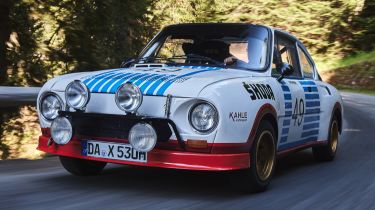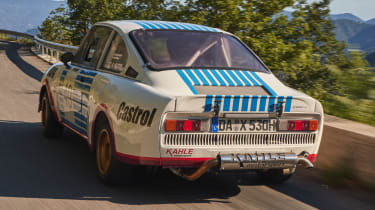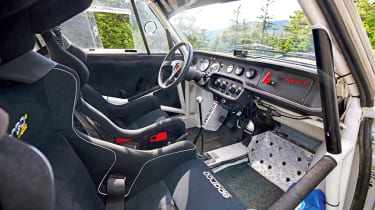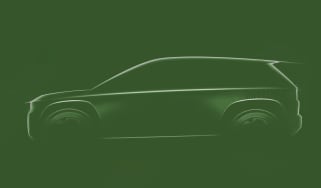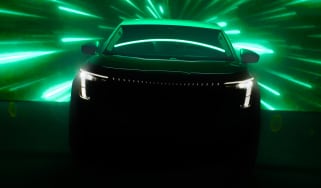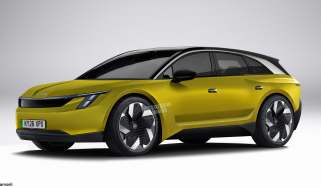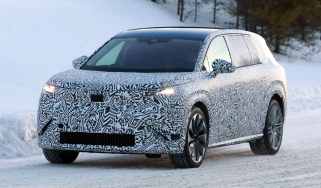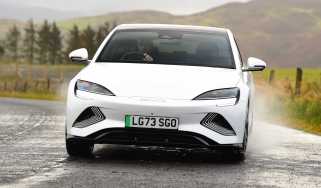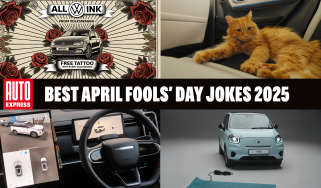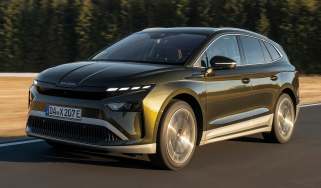Skoda 130 RS ride review: historic Monte Carlo rally hero on the road
Skoda’s link with the Monte Carlo rally goes all the way back to 1912. We hitch a ride in one of its most successful competitors, the 130 RS
The Monte Carlo Rally is one of motorsport’s most iconic events, with a history spanning more than a century. But while hundreds of marques have gone head to head in the mountains above the principality of Monaco since 1911, not to mention wheel-to-the-brink-of-disaster around precipitous stages such as the famous Col de Turini in the Alpes Maritimes, only one manufacturer is permitted to use Monte Carlo badges on its cars with the sanction of the Monaco authorities.
That’s Skoda, which signed a deal to license the name from the city-state in 2011, and uses Monte Carlo badges on some of its sporty trim levels as an homage to its real-life successes on the famous rally. Whether Chevrolet’s bosses did the same when launching the Monte Carlo luxury sedan in 1969, or if Lancia’s 1970s sports coupé was called the Montecarlo without a space in order to avoid the need to pay fees to the then-ruling Prince Rainier III isn’t something we’ve been able to easily determine. Both cars routinely come up when discussing Skoda’s claim that it’s the only one “allowed” to use the badge, although those models played on the principality’s luxury and glamour, rather than its sporting connections.
There’s no doubting the authenticity of Skoda’s sporting connections to ‘the Monte’ though, because the marque’s adventures on the rally can be traced back to 1912 and the second running of an event still then in its original format. The entrants who set off from locations far and wide to ‘rally’ at the destination in Monte Carlo included Count Alexander Kolowrat-Krakowský at the wheel of a Laurin & Klement – a machine from a manufacturer which would soon become assimilated into the greater Skoda industrial enterprise after World War I. In 1936, a pair of Czech drivers took their modified Skoda Popular Sport roadster to second place in the sub-1.5-litre class on the Monte Carlo rally, inspiring Skoda to launch a production version of the car named the Popular Monte Carlo, presumably before the concept of licensing place names had been dreamt up.
The history books record Skoda’s various feats at the famous rally in detail, but we’re skipping a few decades to 1977, when a pair of Skoda 130 RS Coupé works entries bagged first and second places in the under- 1.3-litre class. The car shown here didn’t participate in that Monte Carlo campaign, but it is an original factory competition car from the period, of which around 200 were built. So when Skoda offered us the chance to sample the 130 RS on the same mountain rally stages that helped create the legend, how could we resist?
Even though much of the commentary about the brand and its products was casually patronising in those Soviet-Bloc days of the seventies and eighties, rugged reliability and affordable prices made Skoda models surprisingly popular with a more pragmatic band of Britain’s car buyers. And in the 130 RS, Skoda provided those customers with a genuine hero car.
This beautiful and iconic rally machine is based on the road-going Skoda 110 R coupé, a car jokingly nicknamed ‘the Porsche from the East’ thanks to its rear-engine layout and occasionally difficult handling traits on the limit, which were similar to those of the German brand’s 911. In other words, over-ambitious cornering and/or a lack of technique risked sending you off the road backwards through the nearest hedge.
In spite of the post-WWII engineering still lingering on in Skoda’s product line-up in the 1970s, and the fact that the firm was then the butt of so many jokes, surely no one could argue with the 110 R’s style. In fact, it’s unusual for a coupé with such striking looks not to be linked to a named designer, and had the 110 R been built on our side of the Iron Curtain, it would most likely have been finessed by one of the Italian design houses. Maybe Communist party principles meant the design team at Skoda headquarters wasn’t feted for its work, or maybe it’s just an accident of fate or engineering that the 110 R turned out looking the way it did.
The rear-engined layout helped define the short bullnose front, of course, and that elegant sweeping tail gives the Skoda coupé its profile, but there’s an artistry to this design that Western-European history still risks recording as an Eastern European oddity. Boxy flanks with simple louvred air intakes for the engine, a practical boot up front, an airy cabin with its slender pillars and that blanked off panel where the radiator grille should be – wrapped in flowing lines so simple that a child or cartoonist might have sketched it.
Over the other side of the Iron Curtain, the young Matthias Kahle was equally enthused by Skoda’s 110 R coupé, but growing up in East Germany meant the appeal was potentially a bit more aspirational. Born in 1969, he grew up towards the tail-end of an era in which most people lucky enough to drive a car knocked around in smoky Trabants they’d waited five years to order, and you had to be a somebody to get the chance to own even a regular Skoda saloon car. The 110 R Coupé? An exotic rarity that was simply out of reach for the average citizen, and indeed many were destined for export.
However, Matthias has a more personal relationship with the rallying version of Skoda’s exotic coupé. He tells me a video watched in his childhood of a 130 RS seemingly ‘floating’ around corners on a rally stage helped inspire his journey to becoming a seven-time German rally champion between 1997 and 2010 – so that makes it two heroes we’re meeting today on the Col de Turini.
With just 1,100cc and not much more than 50bhp to play with, the 110 R was no rocket ship, and neither was the 130 RS. However in its class it proved indomitable on its second appearance on the Monte Carlo in 1977, thanks to its 142bhp released from an enlarged 1,300cc version of the standard car’s all-aluminium four-cylinder engine.
The uprated unit had an eight-valve iron cylinder head, and generated enough power for the driver/navigator pairing of Václav Blahna and Lubislav Hlávka to finish first in their class and twelfth overall.
Matthias won several of his many German rally championships at the wheel of two generations of Skoda Fabia, and now as a Skoda ambassador has campaigned the 130 RS at various events and classic rallies. His firm, Kahle Motorsport, looks after the 130 RS we’re getting a ride in today, which means his name is emblazoned across the heat shield on the car’s otherwise exposed exhaust. It’s a safety mod required by event scrutineers, along with a pair of up-to-date racing seats with harnesses, but the 130 RS is otherwise a wonderful period piece.
Sliding into the passenger seat is a bit of a struggle for a six-footer like me, but once inside, the car has an airy, spacious feel. As Matthias thumbs the starter button, the feisty little four-cylinder motor bursts into life behind us.
The roads on the Col de Turini are slick with rain, and Matthias points out the black rubber streaks from this year’s Monte Carlo, rally which are still evident from the event held over this same twisting stretch of tarmac.
It’s immediately obvious that the rear-engine configuration gives the 130 R terrific traction out of corners, even on greasy roads, although Matthias confirms things can get a little tricky in extremis. However, the car is extremely light by modern standards at around 750kg, which helps to moderate any pendulum effect, and also means the rumbustious little engine provides plenty of go.
Acceleration isn’t neck-snapping, but Matthias has the skills to showcase the car perfectly, his deft actions with steering, gear lever and pedals producing a beautifully balanced flow through the corners, and a sense of that effortless ‘floating’ drive he talked about from his childhood. The rear engine makes this rally car’s interior far quieter than many of its contemporaries, too, and helps to make Matthias’s progress seem almost serene from the passenger seat – although it may not have seemed quite that way to the couple of road users we might have startled coming the other way. Then again, if you live near the Col de Turini, the sight of a 1970s rally relic drifting on full lock with its engine blaring is probably par for the course.
| Model: | Skoda 130 RS Coupé |
| Engine: | 1.3-litre, four-cylinder petrol |
| Power: | 142bhp at 8,500rpm |
| Transmission: | Four-speed manual, rear-wheel drive |
| Years built: | 1975-1980 |
| Number produced: | 200 (approx) |
Skoda 110R road car
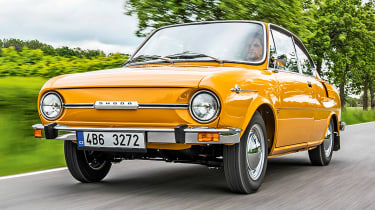
The Pretty 110 R coupé was not a common sight, with fewer than 60,000 examples built over its 10-year history, but it was especially rare in its homeland of Czechoslovakia because around 90 per cent of production went for export. Powered by a 1.1-litre four-cylinder all-alloy engine with twin carburettors, the 110 R could only muster a little over 50bhp, but at a mere 880kg it was a nimble performer and the looks turned plenty of heads. Upgrades over the car’s life included a quad-headlamp front end and a boot spoiler, and the cabin featured plenty of dials with a sporty steering wheel and seats. Although once sneered at by Western European sports car fans, the 110 R is now highly collectible.
Skoda 130 LR Rally car
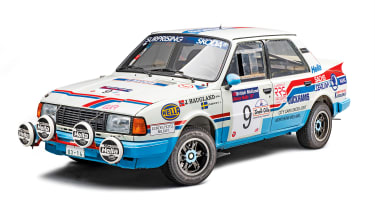
The 130 RS wasn’t the last hurrah for rear-engined Skoda rally cars, because it was superseded in the mid 1980s by a new Skoda Group B car called the 130 LR. No longer a variant of the 110 R coupé, the 130 LR was instead based on the 105/120 saloon, sold in the UK as the Skoda Estelle.
Much of the stylish two-door’s bodywork was fabricated from aluminium, glass was replaced with plexiglass, and with a stripped-out interior the 130 LR tipped the scales at just 730kg. A new aluminium cylinder head helped the 1.3-litre engine produce 130bhp, and aided by suspension upgrades the 130 LR finished 15th in its first international appearance on the 1985 RAC rally.
Driven by Ladislav Krecek and Borivoj Motl to sixth place on the San Remo rally in 1986, the 130 LR’s greatest result was the Turkish round of the European rally championship. The Austrian driver pairing of Gerhard Kalnay and Günter Tazreiter won outright, against Group B big guns such as the Audi Quattro and MG Metro 6R4.
Find a car with the experts

